Discover the Best Board Games for Every Player

10 Best Murder Mystery Board Games 2025
Top Picks:
- Mysterium: Cooperative game where a ghost gives clues using vision cards.
- Sherlock Holmes Consulting Detective: Solve intricate cases in Victorian London.
- Deception: Murder in Hong Kong: Social deduction with hidden roles.
- Chronicles of Crime: Combines physical clues with app-based gameplay.
- Clue (Cluedo): Classic deduction game for families and casual players.
- Detective: A Modern Crime Board Game: Deep, story-driven cases with digital tools.
- Letters from Whitechapel: One-vs-many chase set in 1888 London.
- Awkward Guests: Card-based deduction with clue trading.
- Suspects: Narrative-focused standalone cases.
- MicroMacro: Crime City: Visual search and deduction on a large city map.
Quick Comparison Table:
| Game | Players | Play Time | Difficulty | Highlights |
|---|---|---|---|---|
| Mysterium | 2–7 | 40–60 min | Medium | Vision cards, teamwork, creative deduction |
| Sherlock Holmes Consulting Detective | 1–8 | 90–180 min | High | Non-linear cases, immersive storytelling |
| Deception: Murder in Hong Kong | 4–12 | 20–30 min | Medium | Hidden roles, social deduction, fast-paced |
| Chronicles of Crime | 1–4 | 60–90 min | Medium | App integration, QR code scanning |
| Clue (Cluedo) | 3–6 | 45–60 min | Low | Classic deduction, family-friendly gameplay |
| Detective: A Modern Crime Board Game | 1–5 | 120–180 min | High | Digital database, interconnected cases |
| Letters from Whitechapel | 2–6 | 90–120 min | High | Hidden movement, historical theme |
| Awkward Guests | 2–8 | 45–75 min | Medium | Clue trading, logical reasoning |
| Suspects | 1–6 | 60–90 min | Medium | Strong narrative focus, standalone mysteries |
| MicroMacro: Crime City | 1–4 | 15–45 min | Low | Visual map exploration, quick cases |
Choose based on your group size, play style, and experience level. Whether you prefer quick social games or in-depth investigations, these board games deliver hours of engaging fun.
Mysterium Review
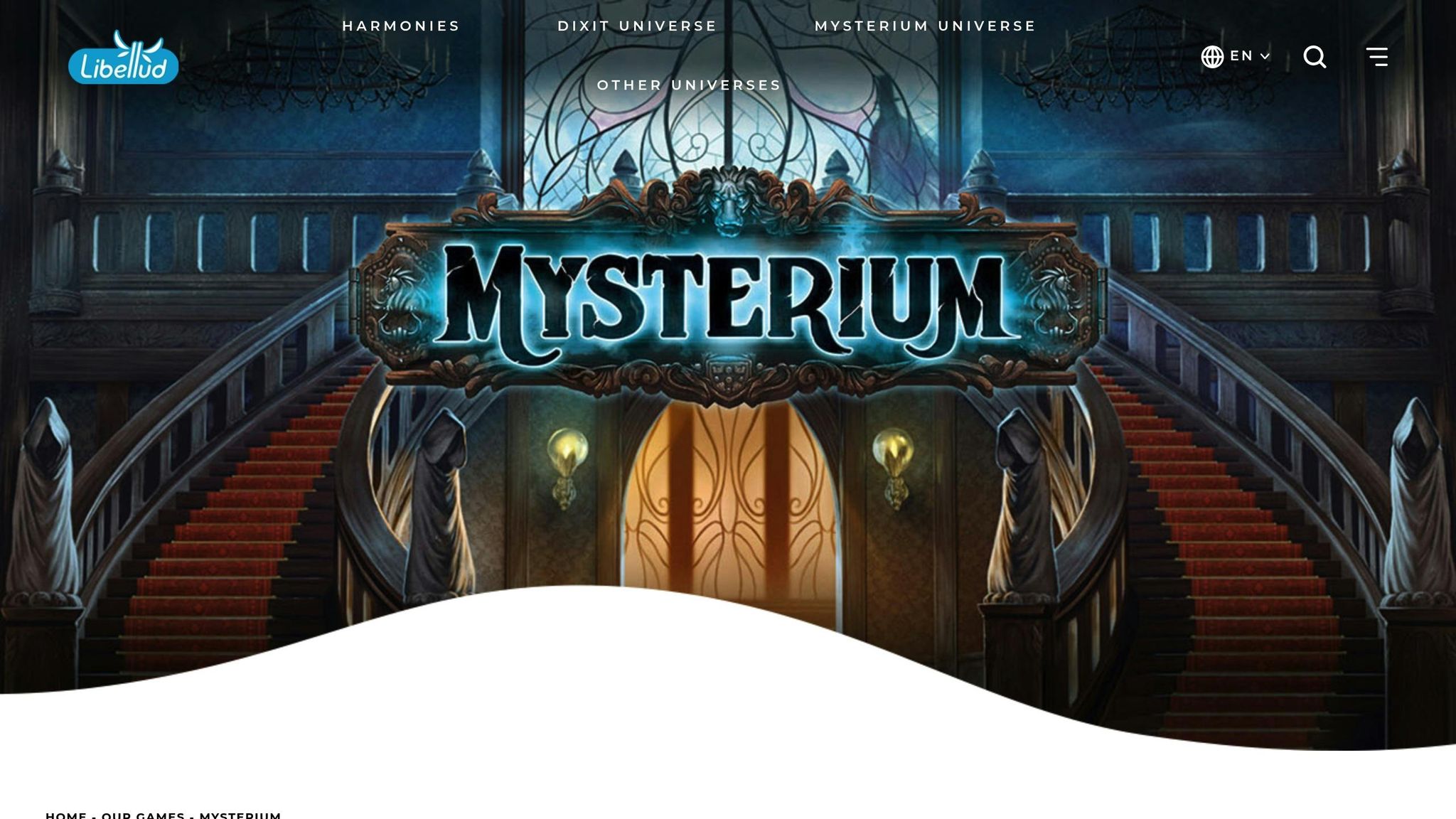
1. Mysterium
Mysterium is a cooperative murder mystery game where players take on unique roles. One player becomes a ghost, using abstract vision cards to communicate, while the others act as psychic mediums trying to interpret these cryptic messages. The ghost knows the details of the crime - who did it, where it happened, and the weapon used - and must guide the mediums to uncover the truth.
The game is built around an intriguing puzzle that combines teamwork and creativity. Its core mechanic focuses on nonverbal communication, requiring players to work together to decipher the visual clues provided by the ghost.
Here’s what makes Mysterium stand out:
- Collaborative gameplay that brings players together
- Endless combinations of clues, keeping each session fresh
- Beautifully illustrated cards that enhance the experience
| Game Component | Details |
|---|---|
| Player Count | 2–7 players |
| Game Duration | 40–60 minutes |
| Age Recommendation | 10+ |
| Game Type | Cooperative |
| Key Mechanic | Vision card interpretation |
| Difficulty Level | Medium |
The ghost’s ability to choose the right cards and the mediums’ knack for interpreting abstract clues are key to success. This dynamic encourages creative problem-solving and effective communication, making every game session both challenging and fun.
2. Sherlock Holmes Consulting Detective
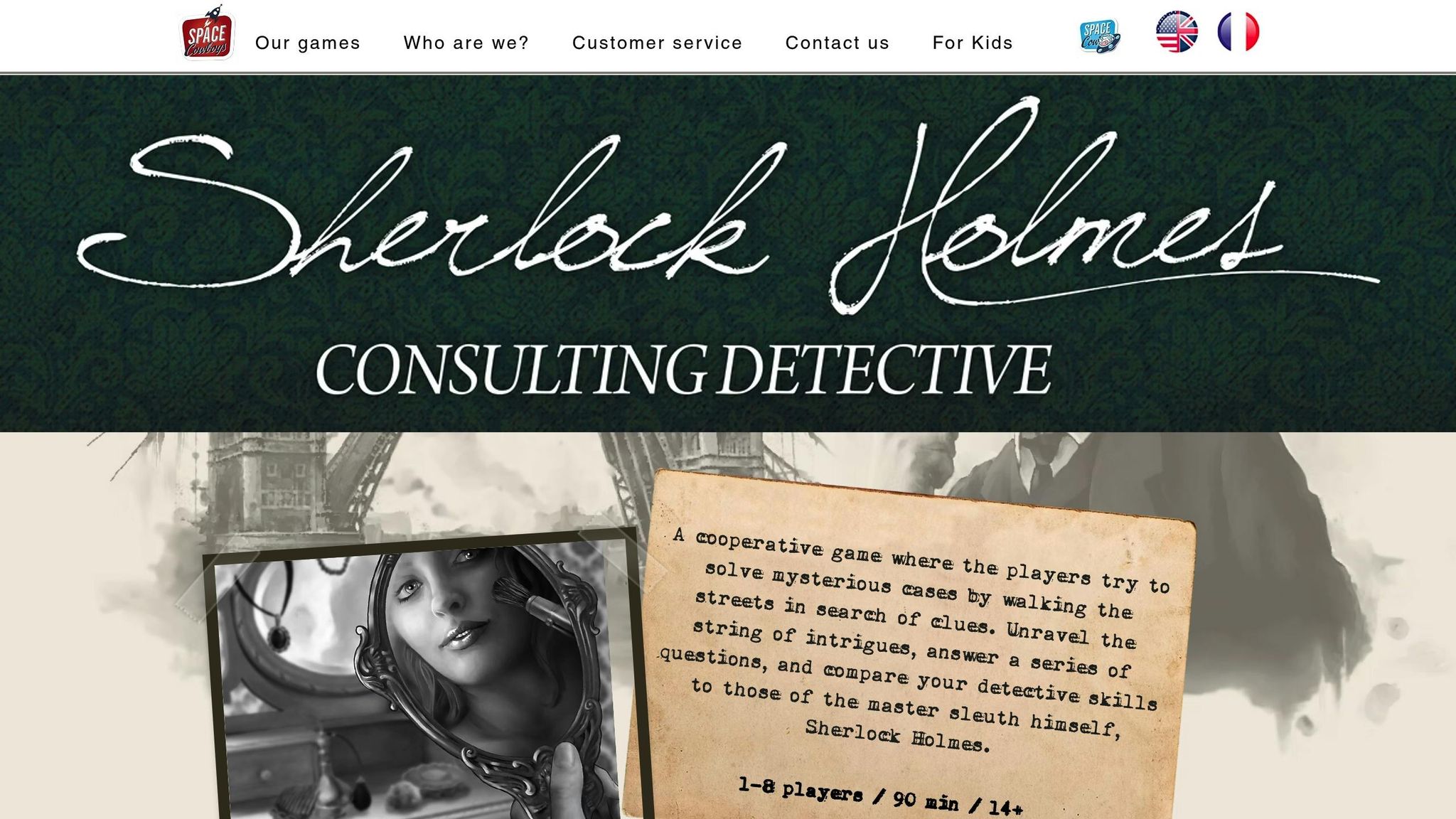
Step into the foggy streets of Victorian London with Sherlock Holmes Consulting Detective. This game invites players to unravel complex cases alongside the iconic detective himself.
Armed with a casebook, newspapers, maps, and directories, players gather clues, chase leads, and piece together events in a non-linear fashion. It’s an immersive dive into detective work that feels like stepping into a classic mystery novel.
Perfect for those who love detailed storytelling and in-depth investigations, this game works well for solo players or small groups, making it ideal for cozy, close-knit sessions.
3. Deception: Murder in Hong Kong
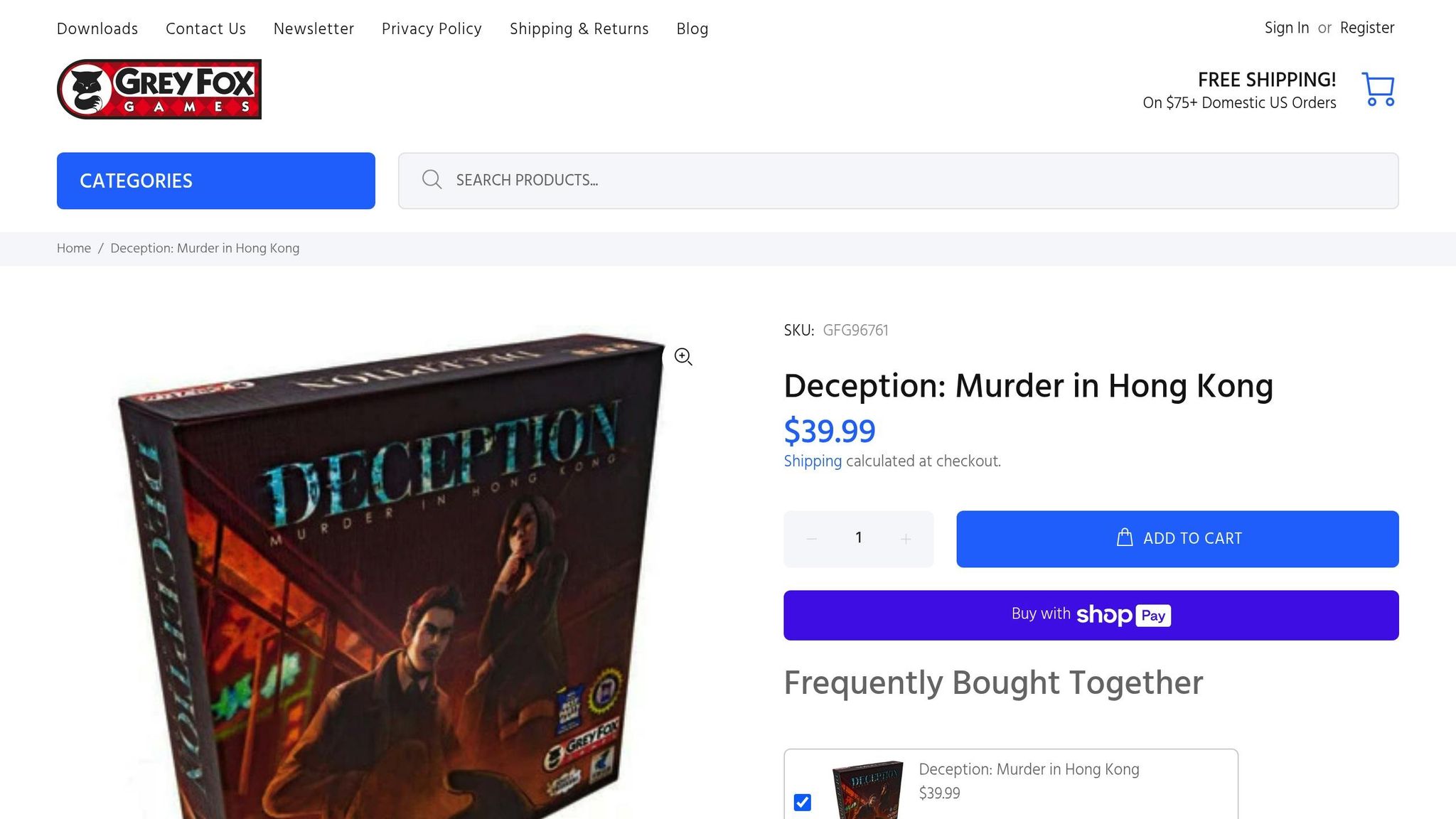
Deception: Murder in Hong Kong is a social deduction game where players collaborate to solve a murder mystery, but there's a twist - one of them is secretly the killer. With limited evidence at hand, the group must piece together clues to uncover the culprit. One player takes on the role of the forensic scientist, providing key hints, while the others debate and analyze the evidence to identify the murderer.
The game thrives on keen observation and lively discussions, building suspense and mistrust with every round. Its simple rules combined with engaging gameplay make it enjoyable for both seasoned gamers and those new to social deduction games.
Find this and other mystery games at Brain Games.
4. Chronicles of Crime
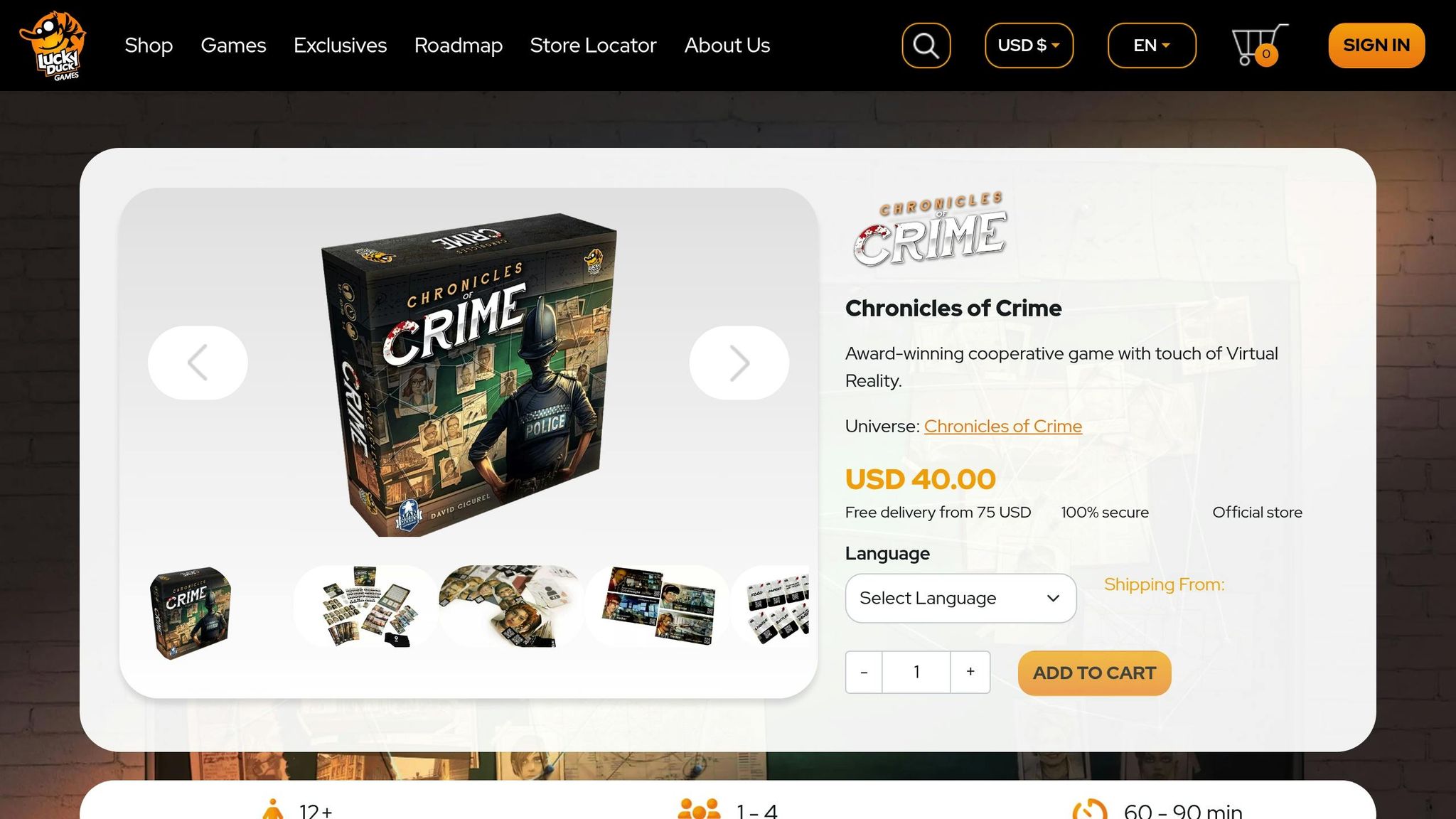
Chronicles of Crime blends traditional board game elements with digital technology, offering a fresh take on mystery-solving games. By scanning QR codes on character cards, evidence tiles, and location boards, players can uncover clues and advance their investigations.
The game’s storytelling system changes based on the choices players make, ensuring no two playthroughs feel the same. Designed for 1–4 players and recommended for ages 14 and up, it features intricate narratives and tough mysteries that cater to both casual players and die-hard mystery fans. This mix of physical and digital gameplay adds a unique layer of depth, making it stand out in the genre.
Check out this engaging game at Brain Games, where you’ll also find expansion packs offering new locations and storylines to enhance your experience.
5. Clue (Cluedo)
Clue (or Cluedo outside North America) has been a staple of board game nights since its debut in 1949. Its mix of strategy, deduction, and social interaction keeps players coming back for more.
In the game, players take on the roles of characters like Colonel Mustard, Mrs. Peacock, and Professor Plum to solve the mystery of Mr. Boddy's murder. Designed for 3–6 players and lasting around 45–60 minutes, it's a great pick for family nights or casual get-togethers. The focus on deduction and strategy is what makes Clue so engaging.
Players navigate a mansion, making suggestions about the murderer, the weapon, and the location of the crime. By carefully observing responses and eliminating possibilities, they work to uncover the solution. While many modern mystery games rely on intricate stories or tech-driven gameplay, Clue sticks to its straightforward, deduction-based roots.
| Game Feature | Details |
|---|---|
| Player Count | 3–6 players |
| Play Time | 45–60 minutes |
| Age Rating | 8+ |
| Difficulty | Easy to learn, moderate to master |
| Key Elements | Room exploration, deductive reasoning, strategic questioning |
Clue’s simplicity paired with its strategic depth ensures it remains a favorite in any mystery game collection.
sbb-itb-1ed942f
6. Detective: A Modern Crime Board Game
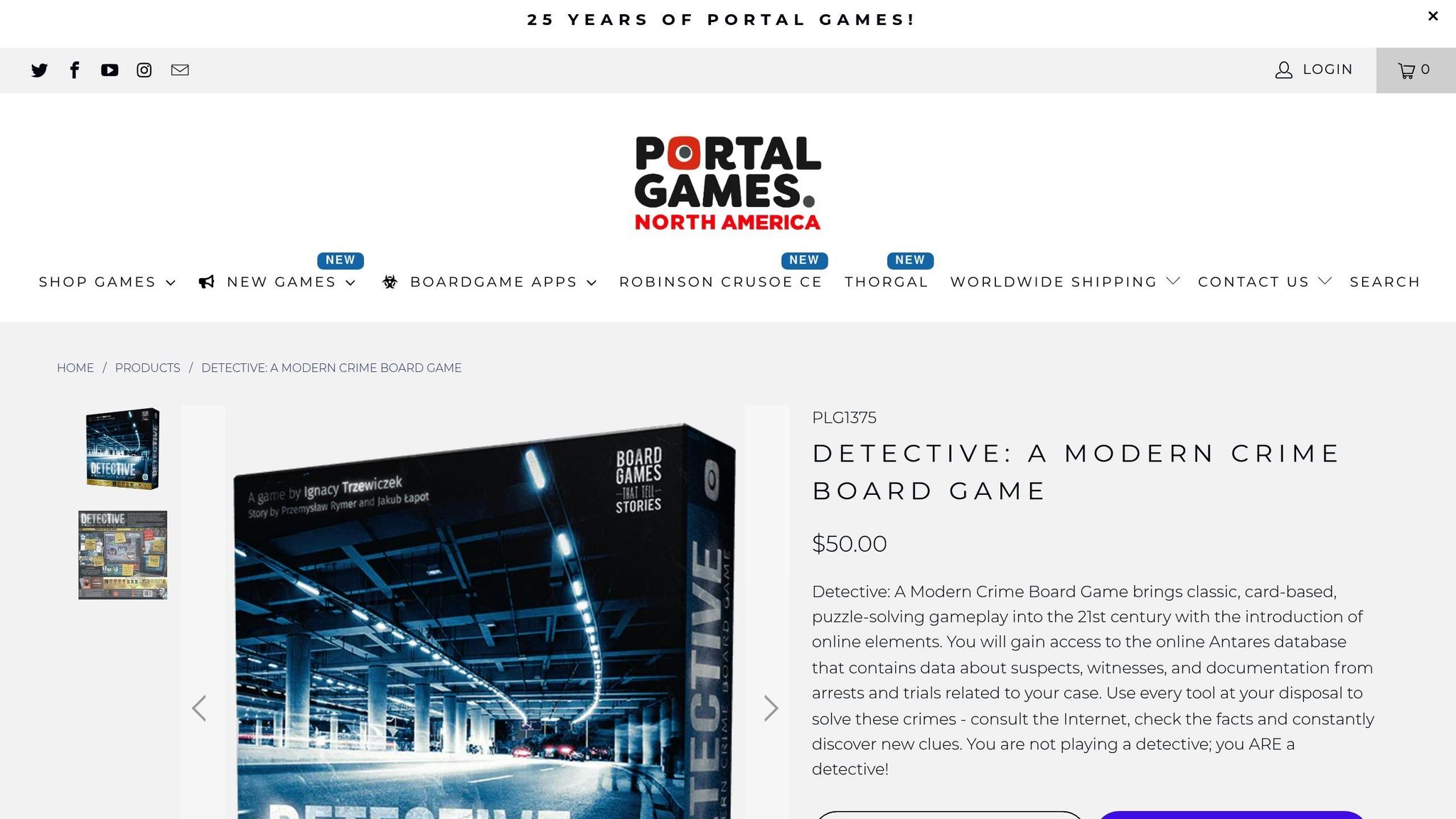
Detective takes mystery-solving to a new level by combining traditional board game elements with digital investigation tools. Using the Antares Database, players can search for clues, cross-check evidence, and analyze data. This mix of physical and digital gameplay creates an immersive and challenging mystery-solving experience.
Designed for 1-5 players, each game session lasts 2-3 hours. The game includes five interconnected cases where players take on the roles of investigators in the Antares National Investigation Agency, solving modern-day crimes.
Key Features
| Feature | Details |
|---|---|
| Player Count | 1-5 players |
| Play Time | 120-180 minutes per case |
| Age Rating | 16+ |
| Difficulty | Complex |
| Core Elements | Digital tools, evidence analysis, time management |
| Campaign | 5 connected cases |
The game’s depth lies in its mechanics. Players must carefully manage their time, deciding which leads to follow and which to skip. Every action moves the in-game clock forward, adding pressure to solve the case efficiently. Investigations involve:
- Reviewing evidence cards
- Searching the digital database
- Interviewing witnesses
- Following paper trails
- Piecing together events
Detective is perfect for seasoned gamers who enjoy rich narratives and extended gameplay sessions. Success requires sharp attention to detail and thorough note-taking, making it more demanding than most mystery games.
The game’s digital component requires an internet-connected device, which adds a layer of realism and complexity to the mysteries.
Pros and Cons
| Pros | Cons |
|---|---|
| Deep and engaging storytelling | Needs internet connection |
| Interconnected, layered cases | Long play sessions |
| Combines physical and digital elements | Steep learning curve |
| Replayable scenarios | Heavy reliance on note-taking |
The game mimics real-life investigations, offering no definitive "right" answers. Players must decide when they’ve gathered enough evidence to close a case, balancing thoroughness with time constraints - a tension few other mystery games can match.
7. Letters from Whitechapel
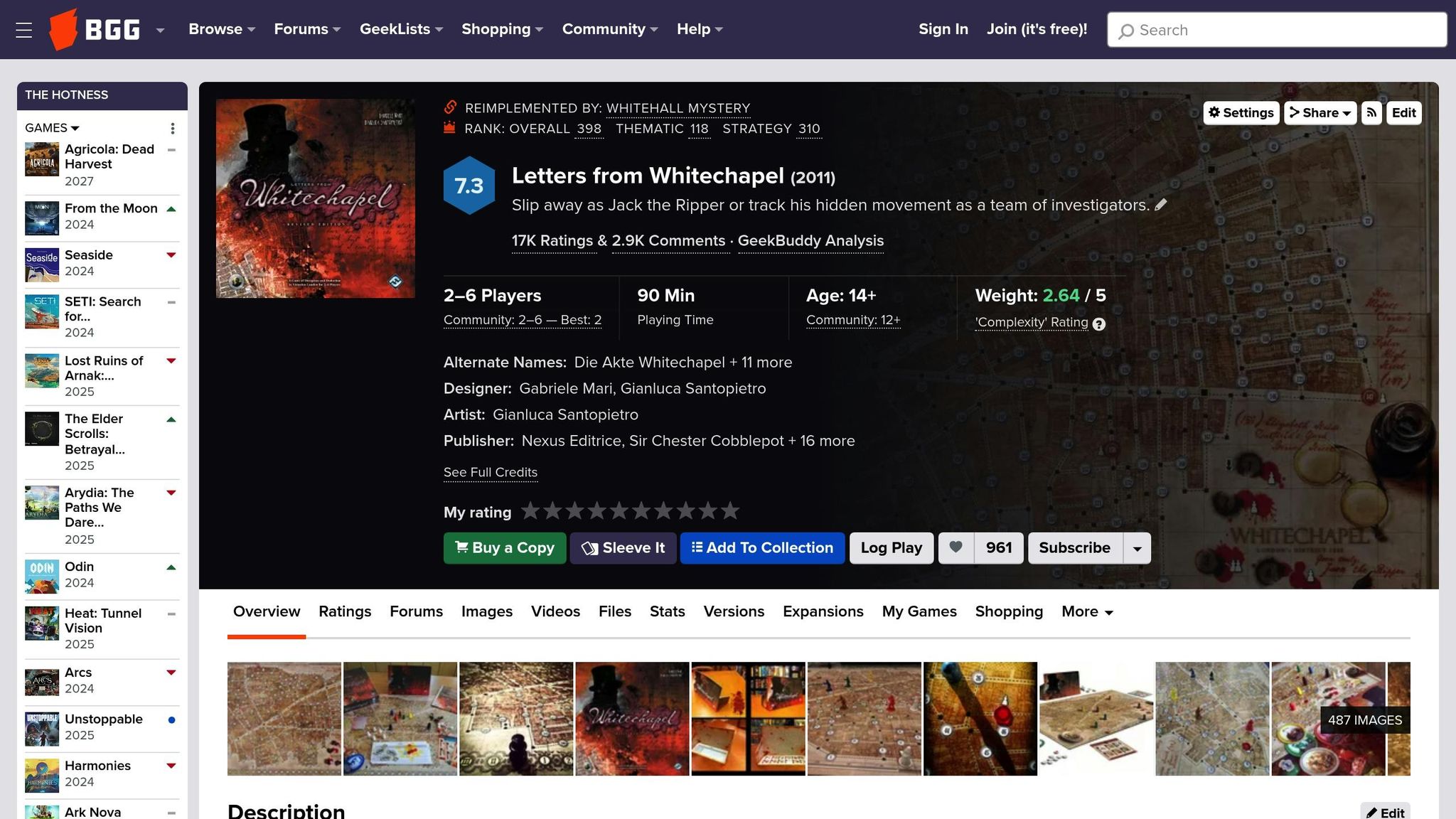
Step into the shadowy streets of 1888 London with Letters from Whitechapel, a gripping board game inspired by the infamous Jack the Ripper case. One player takes on the role of the elusive killer, while the others play detectives hot on their trail. Using hidden movement and strategic deduction, this game captures the suspense of a high-stakes chase through the foggy alleys of historical London.
8. Awkward Guests

Awkward Guests brings a refreshing twist to mystery-solving games with its card-based deduction system. Players trade clues to piece together the details of a murder, relying heavily on logical reasoning. The game's focus on clue exchange keeps things simple yet engaging, encouraging teamwork as everyone works to crack the case.
9. Suspects
Suspects, published by Brain Games Publishing, dives deep into narrative-focused detective work. The game offers standalone cases, giving players a chance to enjoy compelling mysteries without committing to a lengthy campaign.
Each case unfolds organically through character interactions and plot twists, putting the spotlight on storytelling rather than relying on complex game mechanics. This approach sets it apart from many deduction games that lean heavily on structured systems.
If you enjoy mysteries with a strong narrative focus, Suspects delivers an engaging experience that appeals to both beginners and seasoned players.
10. MicroMacro: Crime City

MicroMacro: Crime City offers a unique twist with its visual search and deduction gameplay. The game features a massive, intricately designed city map where players hunt for clues and piece together crime stories. By examining the map, players can unravel the sequence of events, making it engaging for both beginners and experienced mystery fans.
This fresh take breathes new life into crime-solving games. You can find MicroMacro: Crime City at stores like Brain Games.
Game Features Comparison
Here's a detailed look at the top 10 murder mystery board games for 2025 to help you decide which one suits your style:
| Game Title | Players | Game Length | Difficulty | Key Features |
|---|---|---|---|---|
| Mysterium | 2-7 | 40-60 min | Medium | • A ghost player gives clues using vision cards • Cooperative gameplay • Stunning visual design |
| Sherlock Holmes Consulting Detective | 1-8 | 90-180 min | High | • Richly detailed narrative cases • Extensive case files • Explore a map of London |
| Deception: Murder in Hong Kong | 4-12 | 20-30 min | Medium | • Hidden roles • Social deduction mechanics • Quick, engaging rounds |
| Chronicles of Crime | 1-4 | 60-90 min | Medium | • Integrated app for gameplay • QR code interactions • Crime-solving in modern settings |
| Clue (Cluedo) | 3-6 | 45-60 min | Low | • Classic deduction mechanics • Move room-to-room to gather clues • Perfect for families |
| Detective: A Modern Crime Board Game | 1-5 | 120-180 min | High | • Use a database for investigations • Deep, intricate storylines • Real-time decision-making |
| Letters from Whitechapel | 2-6 | 90-120 min | High | • One-vs-many structure • Hidden movement mechanics • Set in a historical context |
| Awkward Guests | 2-8 | 45-75 min | Medium | • Deduction through cards • Multiple scenarios to solve • Encourages information sharing |
| Suspects | 1-6 | 60-90 min | Medium | • Play through case files • Single-use scenarios • Strong narrative focus |
| MicroMacro: Crime City | 1-4 | 15-45 min | Low | • Search for clues visually • Explore a detailed map • Solve quick and engaging cases |
This table highlights essential details: game lengths vary from quick 15-minute sessions (MicroMacro) to immersive 3-hour investigations (Detective). Player counts range from solo play to groups of up to 12, as seen in Deception. Each game offers a mix of difficulty levels and unique gameplay elements, so you can choose based on your preferences and group size.
Dive into these options and pick the one that matches your detective instincts!
How to Choose Your Mystery Game
Looking for the perfect mystery game? Here's how to find one that suits your group size, experience level, and play style.
Group Size
The size of your group matters when picking a game. For larger gatherings (up to 12 players), try Deception. For smaller groups of 2–7 players, Mysterium is a great option. Solo players? Look for games with solo modes like Sherlock Holmes or Chronicles of Crime.
Experience Level
Think about your familiarity with mystery games. If you're new, start with simpler options like Clue or MicroMacro. If you're a seasoned player, dig into more challenging titles like Detective: A Modern Crime Board Game or Letters from Whitechapel.
Play Style
Your play style can guide your choice. Here's a quick breakdown:
| Play Style | Top Picks | Why You'll Love It |
|---|---|---|
| Quick and Simple | MicroMacro, Deception | Short rounds (15–30 minutes) with easy setup. |
| Story-Driven | Sherlock Holmes, Suspects | Immersive narratives with detailed case files. |
| Social and Interactive | Mysterium, Awkward Guests | Encourages lively player communication. |
| Competitive | Letters from Whitechapel | Thrilling one-vs-many gameplay. |
Theme
The theme can make or break the experience. Want something lighthearted? Go for Clue. Prefer a darker, more intense vibe? Letters from Whitechapel might be the way to go. Choose a theme that will keep your group engaged and entertained.






